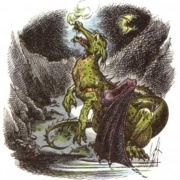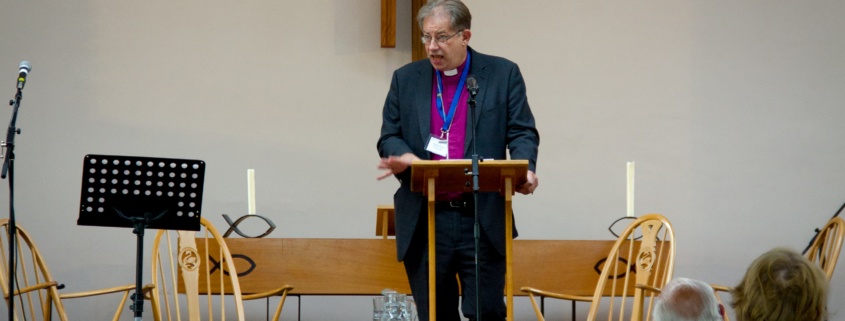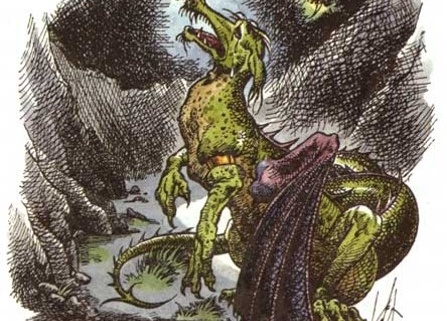Posts

(The following Bible study was recorded at the Living Waters clergy conference. View it here on YouTube)
In the Voyage of the Dawn Treader, CS Lewis offers an enduring picture of the change wrought by grace in baptism. The subject is Eustace, the spoiled child, who has been turned into a greedy dragon. The dragon meets Aslan by a clear pool of water. Eustace tells the story of what happens next.
“The water was as clear as anything and I thought if I could get in there and bathe it would ease the pain in my leg. but the lion told me I must undress first…..I started scratching myself and my scales began coming off all over the place. And then I scratched a little deeper and, instead of just scales coming off here and there, my whole skin started peeling off beautifully, like it does after an illness, or as if I was a banana. In a minute or two I just stepped out of it. I could see it lying there beside me, looking rather nasty. It was a most lovely feeling. So I started to go down into the well for my bathe.
But just as I was going to put my feet into the water I looked down and saw that they were all hard and rough and wrinkled and scaly just as they had been before. Oh, that’s all right, said I, it only means I had another smaller suit on underneath the first one, and I’ll have to get out of it too. So I scratched and tore again and this underskin peeled off beautifully and out I stepped and left it lying beside the other one and went down to the well for my bathe”.
The same thing happens twice more.
“The lion said – but I don’t know if it spoke – ‘You will have to let me undress you.’ I was afraid of his claws, I can tell you, but I was pretty nearly desperate now. So I just lay flat down on my back to let him do it.
The very first tear he made was do deep that I thought it had gone right into my heart. And when he began pulling the skin off, it hurt worse than anything I’ve ever felt.
Well, he peeled the beastly stuff right off – just as I thought I’d done it myself the other three times, only they hadn’t hurt – and there it was lying on the grass: only ever so much thicker, and darker, and more knobbly-looking than the others had been. And there was as smooth and soft as a peeled switch and smaller than I had been. Then he caught hold of me – I didn’t like that much for I was very tender underneath now that I’d no skin on – and threw me into the water. It smarted like anything but only for a moment. After that it became perfectly delicious and as soon as I started swimming and splashing I found that all the pain had gone from my arm. And then I saw why. I’d turned into a boy again.
After a bit the lion took me out and dressed me – (with his paws?) – Well, I don’t exactly remember that bit. But he did somehow or other: in new clothes – the same I’ve got on now, as a matter of fact. and then suddenly I was back here”
Paul continues his focus on baptism in Colossians. First he continues the death and resurrection motif: for you have died and your life is hidden with Christ in God. Our baptism is an ending and a beginning. Our baptism is to be lived out in our everyday growth in holiness.
The death of Christ is a powerful, cosmic event. In the death of Christ, God has erased the record that stood against us and set it aside, nailing it to the cross. He disarmed the principalities and powers.
In baptism we are joined to the powerful, life giving death of Christ. We are buried with him. But this putting to death is a lifelong process as we seek to live out our baptism: to be more Christ-like and a more Christ-like Church. We are called go grow in virtue and holiness.
Colossians shows us, helpfully I think, that this growth in holiness and Christ-likeness is a two fold process. We do not simply live the risen life. We first put to death the things which are not of God. We do not simply put on new clothes. We first take off the old, soiled garments. This is a daily death and a daily rising to new life. It is vital to understanding ourselves and understanding the human condition.
You will know that I have developed an interest and some knowledge of the field of artificial intelligence. I began to be involved because I was given a book by Paul, my eldest son, who works in the computer games industry. The book is by Kevin Kelly, editor of Wired magazine. Kelly argues, rightly I think, that every new development in AI is going to ask new questions about what it means to be human. He writes: “We will spend the next three decades, perhaps the next century, in a permanent identity crisis, continually asking ourselves what humans are good for”.
Think about that for a moment. The world around us is exploring the mystery of what it means to be human. We are ministers of a faith which dares to believe that Almighty God, creator of heaven and earth, became human. We have something to contribute to that conversation.
But here is something else. The brilliant scientists and technology which is reshaping our culture has a particular and hugely optimistic view of what it means to be human. There is at present no vocabulary in the culture to describe the reality of sin and brokenness and imperfection. There are very few ways in this over optimistic emerging culture, to cope with the difficult things in life and to live with imperfection and the call to be better. The rise in mental health issues among young people and adults I suspect has a lot to do with being unable to articulate pain and grief and questions and evil within a meaningful world view.
The world around us needs a new language of sin and forgiveness but also a new language of grace and sanctification. We have a great work of translation to do, a hermeneutic, in the life we live together and in our individual lives.
This is what Paul offers to us. The Church in Colossae is facing the same universal questions. Baptism is a way of life not a once and for all and forgotten experience. Daily we are to put off certain behaviours. There are two lists of five qualities. Fornication, impurity, passion, evil desire and greed in the first. Then in the second, anger, wrath, malice, slander and abusive language. There are echoes of the Sermon on the Mount and of other New Testament lists.
Paul adds the direct command, as it were underlined: “Do not lie to one another”. This is above all an appeal for authenticity and integrity. It is an echo of Blessed are the pure in heart perhaps and of all the references in the Sermon on the Mount about being on the inside as we are on the outside.
Paul then moves very naturally into his second central image drawn from baptism where he will stay until the end of our passage: stripping off the old self, to go back to Eustace, and putting on the new.
As I said yesterday, we know from the accounts of the early church how much drama is involved in the once and for all act of baptism. The candidates are baptised on the night before the dawn of Easter day. They bring all of their old self to the cross.
Before they come to the waters of baptism, the candidates are stripped naked, men and women in separate places, of course. Each is anointed with the oil of chrism for exorcism from head to foot, to drive away the devil and to celebrate this radical new beginning.
Each then goes down into the waters of baptism not once but three times, in the name of the Father and of the Son and of the Holy Spirit. Each then comes out of the water into the light of Easter and puts on new clothes for this new walk with God. These would not be spare clothes kept in a drawer. This would be your normal garment for the next season.
This is the powerful experience and background to our text. Eating washed and dressed is a daily experience not a once and for all event. This baptism was to shape the life of the early church:
“Do not lie to one another, seeing that you have stripped off the old self with its practices and have clothed yourselves with the new self”.
This baptism is a radical, ever present new beginning. It is an outward and visible sign of an inward and invisible grace. It is a work of God and a work of restoration:
“…you have clothed yourself with the new self which is being renewed in knowledge according to the image of its creator”.
Note the reference again to the knowledge of God which is present in the great prayer in Colossians 1 and again at the beginning of Colossians 2: what is meant here once again is the knowledge of God in Christ. Note also that this change is not only about individuals but about the formation of a new community – the body of Christ, the Church, called to be Christ-like:
“There is no longer Greek and Jew, circumcised and uncircumcised, Scythian, slave and free but Christ is all and in all!”
Through baptism we have been joined with Christ and in baptism we become part of the body of Christ, the Church. In Christ our ethnic divisions are healed and made new: a message our world desperately needs to hear.
The following verses are for me one of the most attractive and beautiful descriptions of the Christian life in the New Testament. They continue the language of putting off and putting on only now the emphasis is on the new clothes we are given as we come out of the water. In Ephesians 6, Paul has a similar image but there we are being clothed, as it were, for battle and putting on our spiritual armour. These are our everyday clothes. The first of them is compassion. We are to be different: a compassionate church.
“As God’s chosen ones, holy and beloved” we begin. Each of these titles for the Church is a title of grace. We are who we are because God has loved us, sanctified us through Christ’s death on the cross and called us to be part of his Church. This is not about what we have done.
“As God’s chosen ones, holy and beloved clothe yourselves with compassion, kindness, humility, meekness and patience”.
The English word compassion translates two words in the Greek: heartfelt compassion; mercy; the love we feel in our inmost being. The other virtues balance the two lists in 3.5 and 8. There are echoes again of the beatitudes and of the Sermon on the Mount.
The five abstract qualities are followed by two participles: forgiving one another and being gracious to one another if anyone has a complaint against anyone. Here again there is an echo of the Lord’s Prayer: “just as the Lord has forgiven you, so you also must forgive.
Then Paul returns to the beginning of the letter for the crowning virtue. “We have heard of the love you have for all the saints”, he says in 1.4. Now he says “Above all” – an echo of all those references to all in Colossians 1 – “clothe yourselves with love which binds everything together”. This is the way to completeness or perfection. Perfect knowledge is not enough. Love is the self giving love of Christ, the love described so powerfully in 1 Corinthians 13 (which again shares so much of the same vocabulary).
We need a paragraph break after verse 14. None of the English versions provides one because we go straight from love to peace and they are both virtues and closely linked in Paul’s thought. But the grammar and structure of the words changes. We have come to the end of this long baptismal metaphor now.
We have died with Christ to rise again. We have put to death the old self and risen to the new life. We have taken off our old clothes and put on the new – and Paul has encouraged us above everything else to put on love which binds everything together in perfect harmony. This is the high point of the image.
We then have a threefold form in what is almost a final blessing. The first two verbs use a different form: a subjunctive. In the third arm of the blessing the same verb form is assumed. Each of the virtues is joined to Christ.
Let the peace of Christ rule in your hearts ….
Let the word of Christ dwell in you richly….
And whatever you do, do (let) everything (be done) in the name of the Lord Jesus….
Paul’s benediction to the Colossian Church. Every one of these words can be unpacked. Peace is shalom, health, well being. This is what God calls us into as we said yesterday in the session on clergy well being. God sets his peace within us, to be our governor and guide. The risen Christ says to his disciples in John 20: Peace be with you, my own peace I give you.
The word translated rule is interesting. It means to referee or umpire or guide or judge. Where we are in conflict within, have the courage to go where the peace of Christ directs us and guides us. Discerning that will take time. Chrysostom says “Don’t let passion direct nor rivalry nor mere human peace but the peace of Christ”. The words are addressed to the community not simply to individuals.
“And be thankful”. Again our lives are to begin and overflow with appreciation.
“Let the word of Christ dwell in you richly”. Let Christ’s word and the word who is Christ come and live in you and make a home in you and abide in you not just a little but richly and deeply. I have come to love the practise of dwelling in the word as practiced in this Diocese. Allowing a particular passage to sink in, exploring it from every angle, living with it for a season. Colossians invites us to use many different ways in which this living word dwells within us: “teach and admonish one another with all wisdom and with gratitude in your hearts sing psalms and hymns and spiritual songs to God”. This is exactly what Paul has done in Colossians 1 in exploring the Christ hymn and embedding its thought in the life of the Colossian Church.
And finally the third clause of the blessing:
“And whatever you do in word or deed, do everything in the name of the Lord Jesus, giving thanks to God the Father through him”. Nothing in our lives is outside of the influence of God in Christ. Our faith is not a hobby, for part of our lives. We believe in whole life discipleship: the whole length of our lives, every part of our lives, the call to wholeness of live.
Sisters and brothers, we are called to receive and hold and treasure in our hearts the inestimable riches of Christ. We dare to believe and place our faith in the truth that Almighty God, creator of heaven and earth, has revealed himself fully and completely through his Son Jesus Christ.
We believe that in the words of Colossians, he is the image of the invisible God, the firstborn of all creation. In him all things in heaven and earth were created. He is the head of the body, the church. Through him God was pleased to reconcile all things by making peace through the blood of his cross.
In Christ creation is reconciled. As we are drawn to Christ in contemplation so we are renewed in our understanding of the breadth and depth of God’s love. We are drawn back to the beginning. To our baptism.
Sisters and brothers we are called to be renewed in our appreciation of our baptism. To remember that we are called, as we have received Christ, so to continue to live our lives in him. We have not graduated to some different way of living out our Christian faith whether through length of years or ordination to a particular ministry.
We are called to recentre our discipleship again around that first call to repentance, faith and baptism and to recentre our ministry around word and sacrament, to present each person mature in Christ. We are called to courage and to seek a deep renewal of catechesis and through that renewal a renewal and rekindling of the whole Church.
Sisters and brothers we are called to live out our baptism in dying each day to the old and rising to new life. By stripping off the old self and putting on the new garments of heartfelt compassion and mercy and kindness and love.
We are called to be a Christ-like Church for the sake of God’s world.
+Steven
Living Waters Clergy Conference
Swanwick, 3 May 2018

 Steven Buckley
Steven Buckley